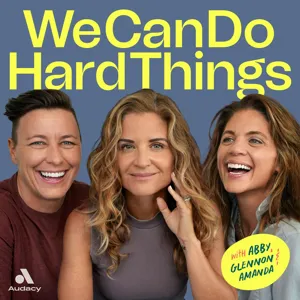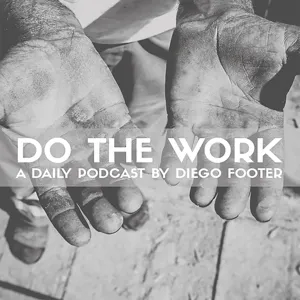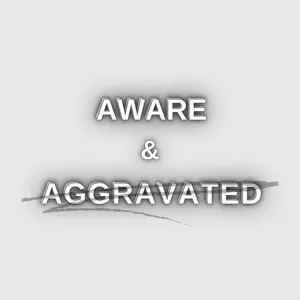Podcast Summary
Innovative solutions for comfort and fit (3rdlove) and gentle protective care (Pampers): Both 3rdlove and Pampers provide practical solutions to everyday issues in their respective industries, promoting comfort, proper fit, and gentle care.
Both 3rdlove and Pampers offer solutions to common problems in their respective industries. 3rdlove addresses the issue of finding a comfortable and properly fitting bra through their innovative half cup sizes, virtual fitting room, and educational resources. Meanwhile, Pampers ensures gentle protective care for babies with their Swaddlers diapers, which absorb wetness better and provide 100% leak proof skin protection, and free and gentle wipes made from 100% plant-based cloth. During the podcast, Alok, an internationally acclaimed writer, performer, and public speaker, shared about their experiences and the importance of breaking free from socially constructed binaries to live out one's full humanity. Intimate violence and lack of understanding from those closest to us can be some of the most challenging aspects of life for many individuals, especially those in the trans community. In essence, both 3rdlove and Pampers provide practical solutions to everyday issues, while Alok encourages us to explore our own identities and break free from societal constraints. By embracing change and understanding, we can make a positive impact on our own lives and the lives of those around us.
Transgender women face challenges and backlash, even from women's rights advocates: Transgender women experience feelings of unlovedness, misogyny, and fear, but it's crucial to promote self-love, acceptance, and the recognition of diverse gender identities.
Transgender individuals, particularly women, face significant challenges and backlash, even from those who advocate for women's rights. Alok V Menon shared their experiences of feeling unloved and unreciprocated in response to their gender identity, leading to a deep sense of grief and fear. Misogyny and patriarchy play a role in shaping self-image and self-perception, leading to negative self-talk and fear of one's own beauty. Despite these challenges, it's essential to continue pushing for self-love, self-acceptance, and the recognition of alternative ways of living and being. It takes courage to challenge societal norms and expectations, but the rewards of living authentically and freely are worth the effort.
Erasing Trans and Non-Binary Histories: The deliberate erasure of trans and non-binary histories limits our understanding of gender diversity and collective experiences, rooted in colonialism and imposition of binary gender categories. Honoring ancestors and their legacies inspires resilience and strength to fight against discrimination.
The erasure of trans and non-binary histories is a deliberate tactic used to disconnect us from our past and limit our understanding of our collective experiences. This erasure has deep roots in colonialism and the imposition of binary gender categories on complex societies. By learning about our ancestors and the rich histories of gender diversity that existed before colonialism, we can find strength, resilience, and inspiration to continue the fight against transphobia and discrimination. The real imposition was not our gender identities, but the narrow definition of gender imposed upon us by colonial powers. It's important to remember that the binary gender system is a relatively recent construct, and that there have always been people who defied these categories and lived authentic lives. Let us honor their legacies and continue the work of creating a world where all people can live their truths, free from discrimination and violence.
Conflict between queer identity and societal expectations: Despite societal pressure to conform, self-ownership and unconditional love are essential for living authentically. Intergenerational trauma can impact our relationships, but challenging limiting norms is crucial for personal growth.
Growing up, the speaker felt conflicted about being queer and Indian due to societal pressure to conform to traditional norms. They recounted an experience of piercing their nose and their grandmother's disapproval, which they now see as an opportunity to show her the possibility of freedom. The speaker also discussed the intergenerational trauma passed down from colonialism and the difficulty of being true to oneself despite societal expectations. The conversation touched on the importance of self-ownership and the impact of conditional love. The speaker shared a personal experience of hiding their identity from their grandmother due to fear and the regret of not being able to be known by her as their authentic self. The conversation also highlighted the importance of unconditional love and the need to challenge limiting societal norms.
The importance of unconditional love and acceptance: Understand that love can be conditional, but striving for unconditional love and acceptance in personal relationships and therapy can lead to growth and appreciation.
Love, especially the love we receive from others, can be conditionally given and received. The speaker shares her realization that her grandmother's love for her was conditional because her grandmother only loved herself when she was excellent, leading her to be most free and beautiful in her later years when she couldn't meet societal expectations. This experience highlights the importance of unconditional love and acceptance, not just in our personal relationships but also in seeking the right therapist to share our deepest thoughts and feelings. Furthermore, the speaker reflects on the concept of gender identity and how it can lead to exclusion and misunderstanding. She challenges the idea of over-identifying with a particular group or label, and instead encourages a more open and inclusive perspective that recognizes the shared struggles and commonalities among individuals. In essence, the speaker's experiences and reflections emphasize the importance of self-love, acceptance, and understanding in our personal relationships and in our understanding of identity. It's through these experiences that we can grow, appreciate each other, and navigate the complexities of life.
Understanding Gender: Personal Experiences and Societal Norms: Gender is complex and personal, shaped by societal norms and personal experiences. Embrace authenticity and challenge rigid definitions.
Gender is a complex and personal experience that can't be defined by rigid rules or performance. Glennon Doyle expressed her struggle with finding a solid sense of gender within herself, contrasting her experience with that of her transgender friend who can find it from the inside. Alok Vaid-Menon challenged the notion that gender is a fixed reality, arguing that language and societal norms shape our understanding of it. They also discussed the importance of liberation from the need for power and the danger of those who seek to control the narrative around marginalized communities, using the example of trans people being portrayed as a threat to women's rights. Ultimately, they emphasized the importance of making new ideas and expressing ourselves authentically, even if it doesn't make perfect sense to others.
From obstacle to spiritual practice: Embracing gender: Our perceptions of ourselves and our roles in society can evolve, leading to personal growth and positive change. Empathy and understanding for all are essential for true progress.
Our identities, including gender, can be a source of pain and oppression, but they can also be a means of healing and spiritual growth. Alok's personal journey from seeing gender as an obstacle to embracing it as a spiritual practice is a reminder that our perceptions of ourselves and our roles in society can evolve. It's important to remember that the way we treat others reflects our own unresolved issues and that true progress requires empathy and understanding for all. The Goldman Environmental Prize serves as an inspiring example of individuals making a significant impact on the environment by setting their minds to a cause and staying passionate about it. Similarly, by acknowledging the deeper spiritual connections to our identities, we can channel our energy towards positive change and leave behind the hot potato of oppression and misery.
Historical and current forms of feminism have harmed marginalized communities: We must address root causes of harmful beliefs and create a more inclusive world for all, recognizing and challenging societal definitions of beauty and womanhood.
Historical and current forms of feminism have excluded and harmed marginalized communities, particularly indigenous women and trans people, by imposing narrow definitions of womanhood and feminism. This entitlement and cruelty, rooted in internalized misogyny and patriarchal systems, perpetuates cycles of violence instead of promoting healing and freedom. Instead of focusing on arguments and appearances, we must address the root causes of these harmful beliefs and work towards creating a more dignified and inclusive world for all. As Alok V menon said, "We have to do the work to interrupt these cycles of violence and insist on a more dignified and beautiful life." Ultimately, true feminism lies in recognizing and challenging the artificial definitions of beauty and womanhood imposed by society, and embracing the unique beauty and humanity of all individuals.
Embracing beauty as a form of healing: Question societal definitions of identity, find joy in unique qualities, and address root causes of trauma and oppression for personal and global healing.
The speaker has shifted her focus from fighting against oppression to embracing and celebrating beauty as a form of deep healing and self-discovery. She encourages listeners to question their identities beyond societal definitions and find joy and worthiness in their unique qualities. The speaker also highlights the connection between trauma and oppression, and the importance of understanding and addressing the root causes of both in ourselves and in the world. Her latest work, "Your Wound, My Garden," invites listeners to diagnose and heal the world's wounds alongside their own.
Trauma as a deeper cause of pain and suffering: Recognize trauma as a root cause, practice self-forgiveness, and intervene with compassion to heal.
Pain and suffering are not the problems themselves, but rather indicators of deeper issues, often rooted in trauma. Misunderstanding or ignoring these signs can lead to further harm. The speaker shares her personal experience of realizing that societal misogyny was a significant contributor to her physical pain and emotional distress. She encourages recognizing the presence of trauma and focusing on healing, rather than just diagnosing the wound. The next right thing to do in facing or interrupting the cycle of trauma is practicing self-forgiveness and intervening with compassion and understanding, as if one would do for a friend.
Understanding ourselves and others through self-forgiveness and poetry: Self-forgiveness and poetry can foster compassion for ourselves and others, helping us connect on a deeper level.
Practicing self-forgiveness and self-compassion can help us develop unbridled compassion for others. This is because we all have flaws and idiosyncrasies, and recognizing this in ourselves can help us understand and empathize with others. The speaker also emphasizes the importance of poetry as a means of expressing and connecting with our true selves, and as a tool for expanding our understanding and capacity for love. By reading and writing poetry, we can tap into the beauty and complexity of the human experience and learn to appreciate the commonalities we share with others. The speaker's personal experience of struggling to share her poetry with others illustrates the challenge of sharing vulnerable, raw emotions, but also underscores the transformative power of poetry to teach us about love and connection.
No matter how difficult things may seem, we have the strength to get through them: We can overcome challenges and emerge stronger, finding peace and healing through self-belief and being true to ourselves
Learning from this conversation with Alok is that no matter how difficult things may seem, we have the strength to get through them. Tish Melton and Brandi Carlile's powerful lyrics serve as a reminder that we can all overcome challenges and emerge stronger. We may hit rock bottom, but it can feel like a new beginning. It's important to remember that we are the ones in control of our lives and have the power to believe in ourselves. The best people are those who are free to be themselves, and it may take time, but eventually, we can find peace and healing. So, let's keep pushing forward and remember, we can do hard things. This message is brought to you by We Can Do Hard Things, produced in partnership with Cadence 13 Studios. Be sure to rate, review, and follow the show on Apple Podcasts, Odysee, or wherever you get your podcasts. Your support helps us continue to bring inspiring and empowering content to you.





